Lecturer of the Year election
They make studying more fun
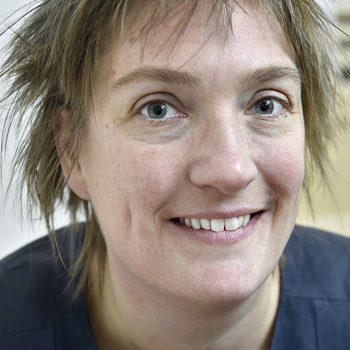
Lemke Kraan
Science and Engineering
Lemke Kraan teaches science journalism at the science education and communication master. As a freelance journalist, she makes radio documentaries for public networks, among other things.
First lecture
‘I became a lecturer quite suddenly, so I hit the ground running. That meant I didn’t have time to be nervous’, Kraan recalls of her first lecture. At a party, she was talking to a friend, saying how much she’d love to teach in her particular field. ‘A few weeks later, she heard that they needed someone for the master. They ended up giving me a call.’ The lesson she learned from this? ‘Always go to parties, and always talk about your ambitions.’
Plans for the future
Kraan would love to put together an editorial team consisting of students. ‘They’d be able to write their own articles for an online magazine. This would make the actual step towards journalism much easier.’
Terug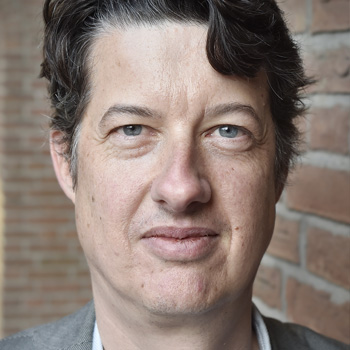
Lars Rensmann
arts
Lars Rensmann is professor of European Politics and Society. Originally from Dortmund, he graduated political science summa cum laude in 1996. He finished his PhD in the same discipline summa cum laude as well. ‘What is important to me is to always stay curious’, he says. ‘Not only about the subjects I am teaching, but also about students’ opinions on the matter.’
First lecture
Rensmann doesn’t remember his first lecture, but he does remember his first seminar. ‘I was terribly nervous. I was over-prepared and knew the answer on every possible question. I was scared of the questions I could get.’ Now he knows better what to expect. Nevertheless, he still gets a bit nervous before lectures. ‘You never really know what is going to happen when you interact with students.’
Plans for the future
‘Keeping an open mind,’ that is what Rensmann wants for the future. ‘Not giving the same lecture over and over again but adjusting your teaching methods and subjects to the changing world.’
Terug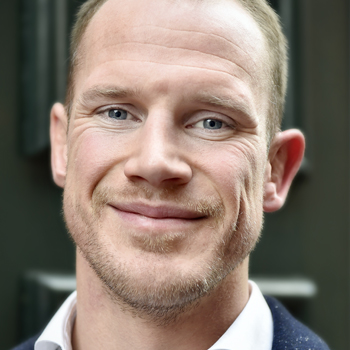
Berend Roorda
law
Berend Roorda finished his master in constitutional and administrative law in 2011. He’s an assistant professor at the department of General Law studies and a researcher at the Centre for Public Order and Safety. He’s also a triple champion of judo in the Netherlands.
First lecture
Roorda gave his first lecture to colleagues, as a practice run. ‘My introduction was way too long. I told my students that they could only take a pen to their exam, and no pencils.’ Once he had to face the actual students, he was ‘pretty nervous’. ‘You get used to it, worry less about stuff. If you don’t know something, it’s perfectly fine to tell student you’ll look it up for them.’
Plans for the future
‘I think it’s really important that we become an educational institute where we look out for each other’, says Roorda. He wants to contribute to this, and to that end helped found the project All Ears. ‘It’s not necessarily about how a student becomes a lawyer or a doctor, but what kind of person they can become.’
Terug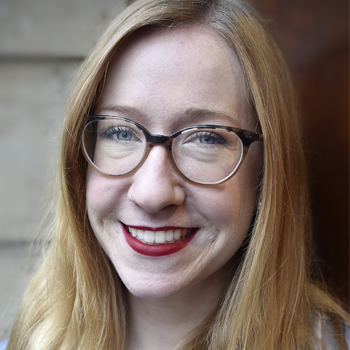
Méadhbh McIvor
Theology and Religious Studies
Méadhbh (pronounced ‘Mayv’) McIvor is a social anthropologist and assistant professor of religion, law and human rights. Originally from Dublin, she received her PhD from the London School of Economics in 2016.
First lecture
Students think McIvor creates an open atmosphere in the classroom and that she knows how to awaken their ‘cross-cultural curiosity’. They write that they find her teaching methods ‘creative’ and ‘inspiring’. ‘The other day I got a notification from Facebook reminding me that I had given my first ever lecture exactly three years ago, on January 9, 2017’, she says. The lecture was on witchcraft and magic. ‘I had about a hundred students, and I was so nervous. There were so many of them and only one of me.’
Plans for the future
Her first book, an ethnographic account of religious activism, will be published by Princeton University Press later this year. ‘I am extremely excited about that. I hope it will make an impact in the field.’ She is also developing a new research project on religion and civil disobedience.
Terug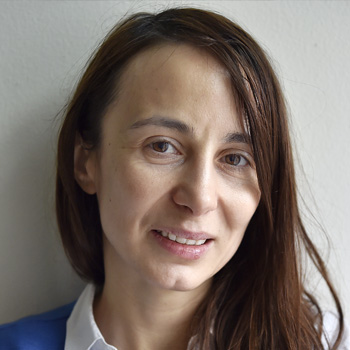
Laura Georgescu
Philosophy
Laura Georgescu studied history of philosophy of science at the University of Bucharest. In 2017, she completed a PhD at Ghent University. She specialises in the connection between early modern philosophy and science.
First lecture
‘It was a course with only four or five students’, Georgescu remembers of her first lecture in 2015. ‘It was a very nice experience, and that was the first time I realized that I liked teaching.’ She constantly learns from her students, she says. ‘Students see the biases you have during lecturing. Because of them, I become increasingly aware of those biases.’
Plans for the future
Georgescu wants students to be more aware of the context that texts are created in. ‘It’s easy to see unfamiliar ideas as simply wrong, but we have to look at them in their historical contexts. We have this tendency to look for errors in texts, but we mustn’t forget to ask why it appears to us as wrong, and why it was not seen as wrong at the moment the statement was made.’
Terug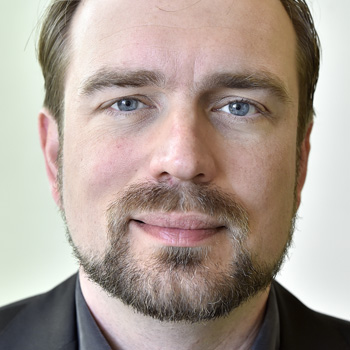
Martin Boisen
Spatial Sciences
Martin Boisen hails from Copenhagen and works at the Faculty of Spatial Sciences. He also operates his own consultancy agency. Boisen doesn’t teach because he has to, he says, but because it’s important to him. ‘It’s my calling.’
First lecture
‘I became a lecturer at the University of Utrecht in the same month that I graduated’, says Boisen. ‘I had to teach a class I didn’t know anything about.’ Half of the students he was teaching were his equals just a few months prior. ‘I thought it went pretty well though, for a first time.’
Plans for the future
‘On my days off, I’m working on my PhD, which has been taking way too long’, says Boisen. ‘I’d like to finish it this year.’ He’d also like to develop a specialist master course.
Terug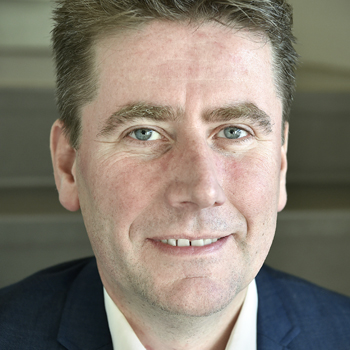
Jaap Wieringa
Economics and Business
After he graduated with a degree in econometrics from Groningen, Jaap Wieringa worked as a consultant. Now, he is a professor of research methods in business, but he emphasises the importance of the link between university and practice. ‘The two enhance each other; guest speakers and research ideas meeting internships and recruitment.’ In 2009 and 2010, Wieringa was also elected Lecturer of the Year at FEB.
First lecture
Wieringa taught his first lecture when the university was still outfitted with old-fashioned blackboards, back in 1994. ‘We didn’t have all this technology and everything was much more complicated’, he recalls. Suddenly, he was teaching people who were just as old as he was, ‘and I had to do it in English, because there was an international student in the class. Laszlo. I remember he was Hungarian.’
Plans for the future
Variety in his classes is very important to Wieringa. To that end, he makes full use of the digital options of this age available to him, such as online discussion boards that he references in his classes. He’d also like to develop more courses that would teach students practical skills, such as working with data.
Terug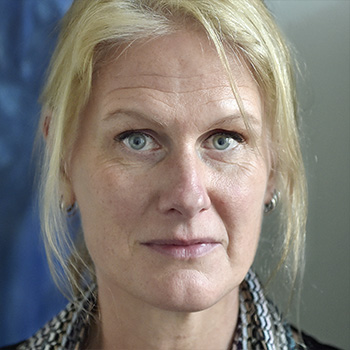
Laura Batstra
Behavioural and Social Sciences
Laura Batstra studied psychology in Groningen and worked as a children’s psychologist before switching to orthopedagogy. She was Lecturer of the Year in 2011. It’s a commendable election, she says, ‘but it’s not really the right way to celebrate good education.’ The winner is the person who’s best at putting on a good show for ten minutes, she says, when there are plenty of good lecturers who don’t thrive in a situation like that.
First lecture
When Batstra was teaching her first lecture eight years ago, on psychopathology, she was mainly worried about technology. Would she be able to operate the equipment in the room? As three hundred students watched, her colleague Rink Hoekstra helped her figure it out. ‘He saved my life.’
Plans for the future
Batstra is currently working on a course on qualitative research. That’s not really her field of specialty, but that’s why she likes it. ‘I prefer getting rid of all the old plans and begin anew, even if I have to master a whole new field.’ She also wants to make sure she remains accessible to students. Recently, two students dropped by after class to correct something she’d said, and she loved it. ‘That’s when you’re doing something right as a lecturer, because we aren’t all-knowing.’
Terug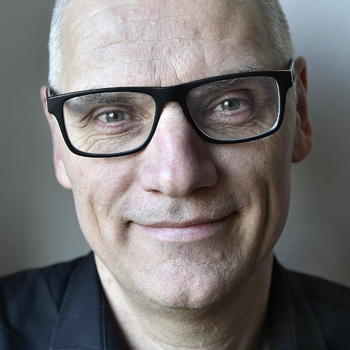
Rob den Otter
Medical sciences
Rob den Otter first went to art school and then switched to study psychology in Nijmegen. He’s been working in Groningen for fifteen years, teaching introductory psychology to first-year students. Den Otter was elected Lecturer of the Year in 2010.
First lecture
Den Otter remembers his second lecture much better than his first. ‘A black spot on my history as a lecturer’, he says. He was ‘freaking nervous’, and completely shut down as he was looking at his slides: he suddenly had no idea what he was talking about. Making up the excuse that he wasn’t feeling well, he ended the lecture. He still has nightmares about it. ‘I can still recall how helpless I felt.’
Plans for the future
Every year, Den Otter has new ideas for improvements. Currently high on his agenda is to make education more active, and to apply this to larger groups as well. ‘Students aren’t hard drives that can just save information. Knowledge is a verb.’ He’s still working on how to do this. ‘I just want to make boring subjects more amusing.’
Terug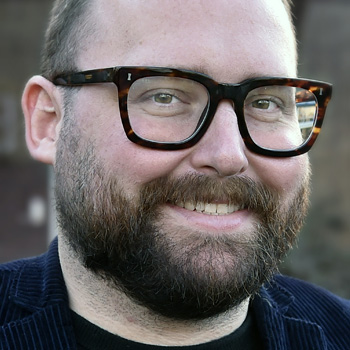
Ryan Wittingslow
University College Groningen
Ryan Wittingslow ended up in Groningen by accident. During a biking tour through Europe in 2016, the Australian came to the Netherlands, where he ‘turned right at Amsterdam and kept going’, until he ended up at the University College Groningen. He trained as an art historian in Sydney, but now considers himself more of a philosopher.
First lecture
‘I’d written down way too much. I was really nervous and talked way too fast’, Wittingslow recalls of his first lecture in Sydney. He was done in thirty minutes, but the class lasted an hour. His second lecture, that same week, went much better. ‘It was less polished, but it was interesting. And students have never complained that I was too lively.’
Plans for the future
Wittingslow was never a fan of talking for long periods of time, but he’d like to introduce more practical and active assignments. He’s been organising excursions and designing new assignments. He’s made students paint for an art class, and in media & technology, students design an object intended for public space, focusing on how the object influences people’s behaviour in that space.
Terug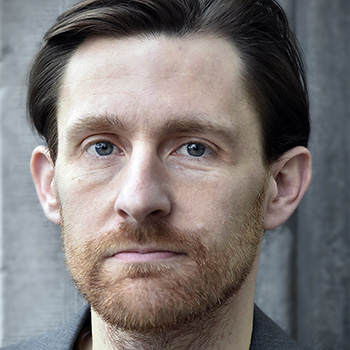
Thomas Long
Campus Fryslân
Thomas Long has been working with the master in sustainable entrepreneurship at Campus Fryslân for two years now. He studied politics and economics in Great Britain and became increasingly interested in corporations’ view of sustainability. He saw the young faculty in Leeuwarden as a challenge.
First lecture
What appealed to him about Campus Fryslân was the small scale of the education. ‘I used to be quite scared of teaching, until I came here.’ Why? His first lecture at the University of Leeds set the tone: it was exhausting. ‘I talked non-stop for ninety minutes. It was no good.’ Now, he introduces sessions with no more than thirty students, and has them discuss the material themselves.
Plans for the future
Long is developing quite a few ‘active assignments’, like setting up a sustainable business model based on a case study. It’s what makes teaching fun, he says. ‘The students are enthusiastic and motivated.’ Now that they’ve nominated him, he’s even more motivated to improve his teaching qualities. He wants to develop his own assessment method; he’s unhappy with the current ones.
Terug
